Posts by Christopher Lochhead
301 Pricing: A (Surprising) Super Power with Dr. Rafi Mohammed, Pricing Expert, HBR Contributor, and Author of The 1% Windfall
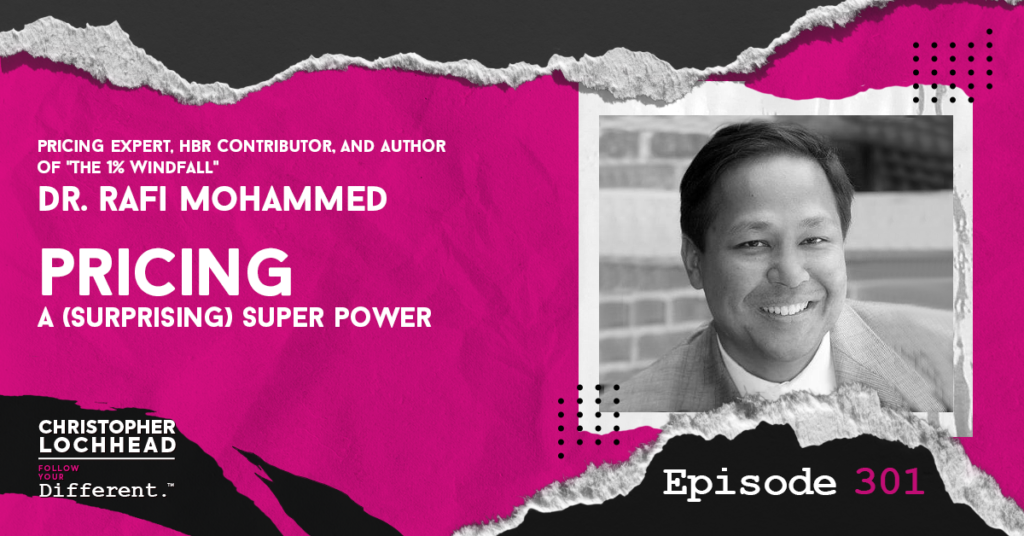
Podcast: Play in new window | Download (Duration: 1:17:47 — 53.4MB) | Embed
Subscribe: Apple Podcasts | Spotify | Pandora | RSS | More
On this episode of Christopher Lochhead: Follow Your Different, we talk about Pricing, and how it can be a Superpower. Our guest, Dr. Rafi Mohammed explains how pricing strategy is one of the most underused power levers in business, and why you should start using it.
Dr. Rafi Mohammed has written over 90 articles on innovative pricing strategies for Harvard Business Review over the years. He is the author of The 1% Windfall: how successful companies use price to profit and grow and the art of pricing. Also, he has got a brand new HBR article out called Expand Your Pricing Paradigm.
When the smartest people in business want to work strategically on pricing, they go to Dr. Rafi Mohammed. So this may well be a very, very valuable episode that could be a demarcation point for you personally and your business.
Pricing is about Capturing Value
This dialogue could not come at a more timely manner for Christopher, as there have been multiple questions and discussions with him with CEOs who are asking very deep questions about pricing. And while him suggesting to double the price was being outrageous, Dr. Rafi agreed to his point that Price should be a function of value.
To calculate their profits, many businesses, in Dr. Rafi’s opinion, erroneously use the formula “cost times a certain percentage,” which he claims is fundamentally flawed. For Dr. Rafi, Pricing is all about capturing the value of the product or service. He gives a story about it to illustrate the point:
“A little example I have of that, that sort of illustrates a story is street vendors in the middle of Central Park. The minute that it looks like it’s gonna rain, many street vendors double the price of their umbrellas. But think about that: the doubling of price has three important thing components of pricing. First of all, it shows that price really doesn’t have a correlation with cost. The second point is price is all about what is the customer’s next best alternative. So if I’m in the middle of Central Park, I can hightail it to a local CVS six or seven blocks away, then get right on to buy an umbrella. Or I can have the convenience of it right now. And the third and most important point of that very simple story is pricing is all about thinking like a customer, how’s your customer thinking?”
– Dr. Rafi Mohammed
Dr. Rafi Mohammed on Highlighting the Unique Value
One of the common practices that is also observable in the tech and Silicon Valley industries is that they view their competitor’s price, and adjust accordingly if they think they are “better” or roughly competing on the same level.
The issue that Dr. Rafi sees in this is that most companies only have a vague idea of the “advantages” that their companies have over their peers. Most do not pinpoint what makes their products or services “unique” from the rest, hence they have problems capturing and justifying the correct value for their product or services. This lack of definition also makes the market more spread out, as consumers have a harder time figuring out which one is the better alternative from each other.
Highlighting the “uniqueness” or in some cases, the “premium” qualities of a certain business also helps consumers figure out if they’re getting a decent price for it, or just paying too much for a small added convenience.
“Here’s also the beauty of pricing. Even if you’re not as good as is the next best alternative pricing come in to save the day? And you can sort of look at customers other eyes, they look, I get that don’t have all the bells and whistles of this of this alternative that you’re looking at. But is it really worth the 40% premium that they’re charging over what I am? And I often tell people that if consumers always want the best, we’d all be driving Rolls Royces.”
– Dr. Rafi Mohammed
The Value of Category Design in Pricing
Christopher then addresses the elephant in the room, which is how category design can affect the value and eventually the pricing of a product or service.
Dr. Rafi explains that his point before still stands, which is how radically different this new category is to its next best alternative. It’s important to communicate with the consumer that they need it because it’s radically different, rather than this is different, therefore you want it even though It pretty much functions the same.
“[An example would be] going from cell phone to smartphone. I could look you in the eye and say, “Look, we have all these different features. You can use apps in the internet, and you can start to put numbers to that.” And so, I think you’ve even in it in a new category, you can base a price off of what the customers alternative would have been, which is an older category plus the extra work they’d have to do.”
– Dr. Rafi Mohammed
To hear more from Dr. Rafi Mohammed and how Pricing can be a Superpower, download and listen to this episode.
Bio
Dr. Rafi Mohammed has been working on pricing issues for over 25 years.
He is the founder of Culture of Profit, a Cambridge, Massachusetts-based company that consults with businesses to help develop and improve their pricing strategies. He also holds the title of Batten Fellow at the University of Virginia’s Darden Graduate School of Business.
Rafi is the author of The 1% Windfall: How Successful Companies Use Price to Profit and Grow (Harper Business), which provides a blueprint for managers to create a comprehensive pricing strategy.
His first pricing strategy book, The Art of Pricing (originally published by Crown Business), has been translated into seven foreign languages.
Rafi has written 90 articles on innovative pricing strategies for the Harvard Business Review. He has a feature article published in the September/October 2018 HBR magazine titled “The Good-Better-Best Approach to Pricing.”
Rafi is a frequent commentator and contributor on pricing strategy issues to the media including Bloomberg Business Television, CNBC, Fox Business News, Today Show, National Public Radio, New York Times, Wall Street Journal, and BusinessWeek.
Rafi’s research has focused on bundling, one of the most popular yet least understood pricing tactics.
This research was published in the Rand Journal of Economics. Rafi has also worked on pricing issues at the FCC during the telecommunications deregulation, National Economic Research Associates (NERA), and Monitor Group.
Rafi was born in Milwaukee and raised in Cincinnati.
He is an economics graduate of Boston University, the London School of Economics & Political Science, and Cornell University (Ph.D.).
Rafi is an avid Bruce Springsteen fan.
Links
Follow Dr. Rafi Mohammed’s works!
Pricing for Profit | Twitter | LinkedIn
HBR Article: Expand Your Pricing Paradigm
We hope you enjoyed this episode of Christopher Lochhead: Follow Your Different™! Christopher loves hearing from his listeners. Feel free to email him, connect on Facebook, Twitter, Instagram, and subscribe on iTunes!
300 Legendary Author Dushka Zapata

Podcast: Play in new window | Download (Duration: 59:57 — 41.2MB) | Embed
Subscribe: Apple Podcasts | Spotify | Pandora | RSS | More
Today marks the 300th episode of Christopher Lochhead: Follow Your Different. And who better to have a dialogue with on this episode than one of our very first guests in the podcast, the amazing Dushka Zapata.
Dushka Zapata is a regular here on the podcast, and is one of my absolute favorite people in the world. She’s the author of many legendary books. Her most recent is called How to Write a Book: or tackle anything you find daunting, which is part of the How to be Ferociously Happy series. When she’s not writing, she has had an extraordinary career as a PR communications executive and coach.
A Period of Creativity
The dialogue starts off with a reversal of roles, as Dushka asks Christopher about how he has been, and congratulating him on his most recent works.
Christopher attributes it to having partners in the craft in Eddie Yoon and Nicolas Cole. He feels grateful that he has been able to work with both in what he refers to as his “business writing band”.
“I think in my case, on the writing side with Cole and with Eddie, when you have partners, we sort of feel like a band. We call ourselves a business writing band, in so far as we’ve committed to do work together for years, and do meaningful work over a meaningful amount of time. And while the three of us have other interests and do other things, we do the vast majority of our writing together. So what being in a creative band means is the quality of the work changes radically.”
– Christopher Lochhead
Christopher adds that while they have overlapping interests, they also each have expertise in other areas, which allows for a multiple perspective on what they write, and can reach out and connect to different audiences.
Creativity as a Way to Connect with Yourself
On the topic of connecting to people, Dushka shares that creativity in a way has a purpose of connecting you more with yourself. She also finds it wonderful that while you are doing so, other people can join you on that path of self-connection.
“I feel like being connected to the part of me that creates, which in my case is mostly writing. But it can be anything. Creativity can be baking, or raising a child or anything that creates something from nothing. But I think it’s us at our most us.”
– Dushka Zapata
Writing as a Superpower
It usually is the case for people who create is that the more they get older, the less they create. Though it does not seem like it for Dushka, as she continues to write and share new things enthusiastically as time goes on.
For Duskha, she feels like she has even become more creative as she grew older. Because for her, it’s something that she genuinely enjoys doing.
“My relationship with writing is idyllic. I have heard great writers like Hemmingway say that you have to bleed at the keyboard. And I have never associated writing with anything that hurts. I have never felt frustrated with it. Or I’ve never experienced writer’s block. I’ve never felt that I have to suffer at the keyboard or with my pencil. It’s just pure joy. It always has been.”
– Dushka Zapata
To hear more from this amazing dialogue with Dushka Zapata, download and listen to this episode.
Bio
After working for more than 20 years in the communications industry, Dushka noticed a theme.
People find it very difficult to articulate who they are and what they do.
This holds true for both companies and for individuals.
For companies, this is an impediment to the development of an identity, a reputation, a brand.
It makes it hard for customers to see how companies are different from their competitors.
For individuals, in a new world order of personal brands, it makes it hard to develop one that feels real.
This is the focus of Dushka’s work: she helps companies and people put into simple terms who they are, what they do, and where to go next.
Her work comes to life through message development, presentation training, media training and personal brand development.
It comes to life through executive coaching, workshops and public speaking.
It comes to life through what she writes.
Dushka has written ten bestseller.
Her work has been consumed on Q&A site Qoura 180M times.
Links
Connect with Dushka Zapata!
Amazon Authors | Quora | LinkedIn | Instagram | Twitter
We hope you enjoyed this episode of Christopher Lochhead: Follow Your Different™! Christopher loves hearing from his listeners. Feel free to email him, connect on Facebook, Twitter, Instagram, and subscribe on iTunes!
299 Ukraine: How 3 Entrepreneurs Make A Massive Difference with Denys Gurak of A.D.A.M., Iryna Savytska of Bank of Memories, Dr Amarjot Singh of Skylark Labs
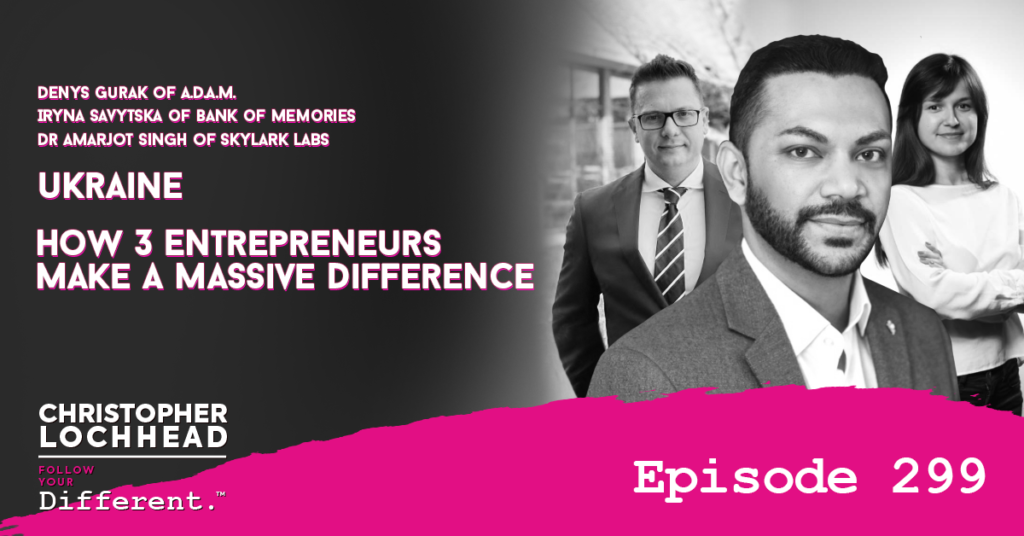
Podcast: Play in new window | Download (Duration: 1:06:41 — 45.8MB) | Embed
Subscribe: Apple Podcasts | Spotify | Pandora | RSS | More
On this episode of Christopher Lochhead: Follow Your Different, we have a much-needed conversation with Denys Gurak of A.D.A.M., Iryna Savytska of Bank of Memories, and Dr. Amarjot Singh of Skylark Labs about the commitment to make a difference and standing up for what you believe in. We also get into how entrepreneurs and startups in Ukraine are answering the call to help their homeland from within and beyond.
Denys Gurak and his company A.D.A.M. is a pioneering 3D bio printing company whose primary focus is 3D-printing bones, with the hopes of using the technology to assist medical professionals in helping injured soldiers.
Iryna Savytska is the CEO of Bank of Memories, which is a blockchain startup focused on allowing families to protect the memories of all their loved ones, as well as key documents and assets for the next generation.
Dr Amarjot Singh is the founder and CEO of Skylark Labs, a company that is designing a new category of next gen AI powered security products that can detect and save people from drone attacks and other threats.
These three entrepreneurs and category designers prove the axiom, “Everything is the way that it is because somebody changed the way that it was.” And they are changing the way that it is.
A Snapshot of life in Ukraine
The conversation begins with a question about the current conditions inside of Ukraine, and what are the immediate concerns that the public needs to know and help with if they can.
Iryna shares the news of the recent rocket barrage by Russia, which was quite a dangerous yet almost routine for them nowadays. One of the things that hit the most is the current conditions in Ukraine, where they are forced to rely on generators to get electricity and water, things that people in the 21st century shouldn’t be worrying about anymore.
She also describes the situation in some areas outside Kyiv, where looting and robbing houses have been happening. Most are being done by Russian soldiers, but there have also been other unscrupulous people taking advantage of the confusion around them to loot and steal.
Physically away, mentally in Ukraine
Denys Gurak talks about his experience living outside of Ukraine and seeing what is happening on the ground from the outside looking in. He shares that a lot of Ukrainians he knows who are also living in the US feels a certain guilt that they’re not there and physically support their families and countrymen.
But he says that rather than wallow in guilt, it’s better to convert it into somethings productive and helpful for their countrymen, and do whatever they can even from a distance.
When asked if it was a fucked-up thing for a young entrepreneur like themselves to be thinking about war and what to do about it, Denys has this to say:
“Actually, it gives you experience and makes you stronger. I mean, you have to try to switch any situation from a problem to an opportunity. Otherwise, you can just sit at home on the couch and do nothing. And for many of us, that’s not an option now, is it?” – Denys Gurak
Dealing with Drones
Dr Amarjot Singh talks about drones, particularly on what they are developing at Skylark Labs. Their aim is to use drones on the side of Ukraine to help guiding systems and give a pre-emptive warning to people that Russian drones have been sighted in the vicinity.
One of the issues with the usual procedures is that drones usually flight high and are hard to find using conventional means. Skylark aims to counter this with drones of their own, but focus on counteroffensive rather than escalation.
That said, this technology can eventually help in surveillance and exploration of certain areas, especially once it has been developed to withstand different weather and abrasive conditions. Dr. Singh and his team are hopeful that it can be very helpful in maintaining a clear airspace in Ukraine and monitoring towns and other areas for national security.
To hear more from these amazing people, their startups and how they are helping in the Ukraine effort, download and listen to this episode.
Bio
Denys Gurak
Denys Gurak is an experienced C-level manager and serial entrepreneur. He is a CEO and Co-Founder at A.D.A.M., a 3d bioprinting company with a primary focus on 3D-printed bones. Denys’s ultimate vision is to build an on-demand personalized tissue manufacturing platform that would be a one-stop shop for transplanted tissues and organs; and, hence, to cut barriers to medical treatment for millions.
Denys’s passion for biotech can be traced back to 2010, when he was leading the international relations and certification, along with EU legislation adaptation at the Ukrainian medicinal products regulatory authority (official position – director of the «GMP/GDP Center» of the State Administration of Ukraine on Medicinal Products (SAUMP).
In 2014 Denys joined the Ukrainian Defense Industry (a state defense conglomerate) in 2014 as the Deputy Director-General for foreign economic activity. During his time at the company, he managed the export-import operations that amounted to USD 1 billion yearly turnover.
Furthermore, Denys represented Ukraine as the Head of Ukraine’s delegation to the NATO Industrial Advisory Group (NAG), and led the industry transformation initiatives, including innovations development and technology JVs, as well international relations.
Denys is a Venture Partner at ff Venture Capital a high-performing early-stage venture firm based in NYC and Warsaw, Poland, focusing on disruptive IT, biotechnology, aerospace and security projects in CEE region.
His passion for strategic modeling and technological disruption, as well as his outstanding networking skills and analytical mindset define Denys’s active role in expert society. Besides business matters, Denys is the key member in a number of think tanks and NGOs.
Iryna Savytska
Iryna Savytska has 12 years in Business Development, MBA, 3 years in web3.
She’s a Tim Draper and Erasmus Scholar, been named TOP 20 Women in ICT 2021 Women Tech Network (Silicon Valley), named a TOP 20 Women in Tech Entrepreneurship 2020 Ukraine according to USAID
She’s raised 15 million USD in investments, and lived in 4 countries, and speaks 4 languages.
Iryna is founder and CEO of Bank of Memories, a service that helps to keep memories and assets and pass them on to new generations. The technology behind is blockchain and decentralization. This way the data will be stored permanently, safely, and available even for future generations.
Key features include:
- Family tree
- Smart storage with 3D memories – image, voice, background
- Time Capsules
- Digital will
Backed by Angel investors, blockchain protocol, advised by Paul Allen, founder of Ancestry.
Dr Amarjot Singh
Dr Amarjot Singh, the founder and chief executive officer (CEO) of Skylark Labs Inc. (https://skylarklabs.ai/), develops next-gen AI-powered security products to identify and continuously learn new known threats.
These systems can revolutionize reconnaissance operations across the land, sea, and air by proactively alerting for known and unanticipated threats beyond visual line-of-sight (BVLOS).
Their proprietary systems analyze cameras and radars on land, drones, helicopters, missiles, and satellites, with primary National Security and Public Safety applications.
Before launching Skylark, Dr Singh worked as a research fellow at Stanford University, USA, as part of the DARPA’s Life Long Learning (L2M) program (2019-2021). Dr Singh developed a framework for Artificial General Intelligence (AGI) at DARPA, allowing models to identify and learn new threats continuously. Before DARPA, Singh received his doctorate in Artificial Intelligence (Deep Learning) from the University of Cambridge, the UK in 2018.
He has also been associated with several other institutions, including Massachusetts Institute of Technology (MIT), Harvard University, National University of Singapore (NUS), INRIA Sophia Antipolis, France, University of Bonn, Germany, Simon Fraser University, Canada, Indian Institute of Science (IISc), Bangalore, India, Innovation for Defense Excellence (Indian Defense) etc.
Singh has made several practical and academic breakthroughs using his breakthrough AI technology in artificial intelligence and computer vision with over 50 international journal and conference publications, along with four provisional patents.
His age-invariant face recognition app for non-profits led to the rescue of 13 trafficked children from brothels in India, placing him on the prestigious MIT 35 under 35 list.
His research on ‘Disguised Face Recognition’ and ‘Violent Activity Detection from Drones’ gained international attention and was covered by several media houses, including the BBC World News, London, NBC, USA, ABC Radio, Australia, Telegraph, UK, Discovery Channel, Canada, New Scientist, The cover of the Economist, Vice, Inc. etc.
Links
Connect with Denys Gurak
A.D.A.M. Bio Printing | LinkedIn | Twitter
Connect with Iryna Savytska
Bank of Memories | LinkedIn | Twitter
Connect with Dr Amarjot Singh
Skylark Labs | LiinkedIn | Twitter
We hope you enjoyed this episode of Follow Your Different™! Christopher loves hearing from his listeners. Feel free to email him, connect on Facebook, Twitter, Instagram, and subscribe on iTunes!
298 Is Sam Bankman-Fried the Crypto Madoff? with “Madoff Talks” Bestselling Author Jim Campbell
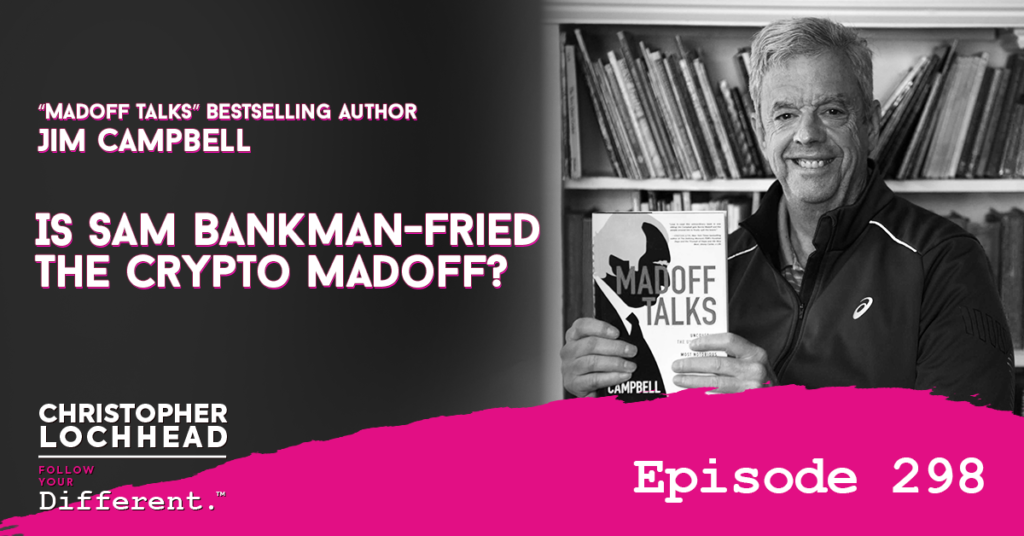
Podcast: Play in new window | Download (Duration: 1:29:13 — 61.3MB) | Embed
Subscribe: Apple Podcasts | Spotify | Pandora | RSS | More
Given recent events in the world of Cryptocurrency, almost everyone in business is currently pondering the following question: Is Sam Bankman-Fried, founder and CEO of the crypto exchange FTX, the Bernie Madoff of Crypto? Or is he merely an entrepreneur who made some horrible errors? Today at Christopher Lochhead: Follow Your Different, we are joined by the legendary Jim Campbell to examine this question.
Jim Campbell is the author of the bestselling definitive book on Bernie Madoff called Madoff Talks. We did a deep dive with him on the book and on the topic of Madoff himself. Check it out if you’re interested in how Madoff manipulated everything before it all fell apart (FYD 217).
On this episode of Christopher Lochhead: Follow Your Different, we go deep with Jim Campbell on the similarities and the differences on old school scammers like Bernie Madoff and the disaster that is Sam Bankman-Fried and the fate of FTX.
Jim Campbell on Sam Bankman-Fried: Madoff 2.0 or not?
The dialogue starts off direct to the point: is Sam Bankman-Fried Madoff 2.0?
Jim responds that there are similarities but also differences between the two. The biggest similarities is that both Madoff and Bankman-Fried comingled their firm and customer assets to boost the value of its company, with Bankman going so far as to use said money to create more connections in the tech, business, and even so far as government and politics.
Both were also involved in something like a Ponzi scheme, though FTX allegedly took it a step further by using its own FTX tokens as collateral to further increase its own valuation, which is a form of market manipulation.
The baffling behavior of Sam Bankman-Fried
When you are accused of a crime as big as the one Sam Bankman-Fried is currently facing, it’s normal to avoid the public eye for a while, and make no statements unless in the presence of their lawyer, lest they say something incriminating.
Which is why Sam Bankman-Fried’s behavior baffles everyone, as he goes so far as guest for certain podcasts and interviews. Yet he still had the arrogance and audacity to say that he didn’t know what he has done would result in a loss of $32 billion dollars for their investors and consumers.
Jim Campbell on doing your due diligence
The thing is, there were a lot of questionable aspects to FTX, once you dug into their model. Unfortunately, doing the due diligence seems to be a rare thing nowadays, due to the fear of missing out. With the boom of crypto in the latter half of the 2010s and even more so during the pandemic, investors wanted to hop it to latest coin or token, should it increase in value exponentially like what happened to Bitcoin.
Some tech companies and businesses are also guilty in this regard. Take for example on what happened to Theranos. Businesses were so eager to jump in even with just a concept, because they think it’ll be more expensive to establish connections and partnerships later on. Some were dazzled by the names attached to the concept, others by the “projected” earnings should it be developed. In the end, they all lost their investments because they couldn’t be bothered to do their due diligence beforehand.
To hear more from Jim Campbell, download and listen to this episode.
Bio
Jim Campbell is the host of the nationally syndicated radio show Business Talk with Jim Campbell. He is known for his hard-hitting interviews of leading figures from the worlds of business, politics, and sports.
Known for “firsts,” Campbell snagged the first extensive interview with former New York Governor Eliot Spitzer after his resignation, the first interview with former Tyco CEO Denis Kozlowski after his release from prison, and the first broadcast interview with former stock analyst Roomy Kahn, a government informant in one of the biggest insider trading busts in American history.
Campbell’s extensive corporate, consulting, and entrepreneurial business background includes roles at KPMG Consulting, Dean Witter Financial Services (now Morgan Stanley), and IBM. He is founder and president of JC Ventures, Inc., a management consulting business.
Links
LinkedIn: in/JimCampbell
Book: Madoff Talks: Uncovering the Untold Story Behind the Most Notorious Ponzi Scheme in History
More about Bernie Madoff and Madoff Talks:
Wall Street Journal: Bernie Madoff Dead at 82
CNBC: Bernie Madoff dies, Mastermind of the Nation’s Biggest Investment Fraud
More about Sam Bankman-Fried:
Exclusive: SBF secretly funded crypto news site
We hope you enjoyed this episode of Follow Your Different™! Christopher loves hearing from his listeners. Feel free to email him, connect on Facebook, Twitter, Instagram, and subscribe on iTunes!
297 GrubHub: Bedroom Start Up To Billion Dollar Category King with Mike Evans, Grubhub Founder & Author of Hangry

Podcast: Play in new window | Download (Duration: 54:53 — 37.7MB) | Embed
Subscribe: Apple Podcasts | Spotify | Pandora | RSS | More
Plato once said that Necessity is the mother of Invention. This could not be anymore true with Category Design, and for our guest today, Mike Evans.
Mike Evans is the founder of Grubhub, a category in food delivery service that was born from the necessity of having a multitude of options in one app, rather than having to look for it in different websites or printed pamphlets. From a budding delivery guide, Mike grew his company into a premier delivery ordering platform, and became Category King in this regard.
On this episode of Christopher Lochhead: Follow Your Different, we go through Mike Evans’ journey, from the spark of the idea to managing a successful startup and beyond.
Mike Evans on the inception of Grubhub
The conversation starts off with Mike sharing how their love for great food made them a big fan of ordering.
“I live in a household with a woman who loves to cook. Because we like to eat, sometimes we don’t feel like cooking. And when I say we, I mean her – I helped mildly. And maybe it’s because we’re getting a little older or whatever, sometimes you just don’t feel like the rigmarole of going out to a restaurant and sitting down and that. And there’s this magical ability to press a button on your Star Trek communicator and have a very nice person show up at your house with some very warm food from one of your favorite local restaurants. It’s a fucking miracle.”
– Mike Evans
Grubhub came at a time that the home internet is still finding its foothold in everyone’s household, and is one of the first few apps you’ll find in the App Store.
Necessity brings Innovation
But as the idea might seem like a simple one nowadays, it’s surprising that we haven’t thought of it sooner, even as a simple website or catalog.
Of course, there was the yellow pages, but it’s not like there’s a dedicated section there for restaurants, and the numbers aren’t always updated. And you still have to resort to pamphlets to find out what’s on the menu, so can be quite redundant.
“I just wanted to find who delivered to me, and the Yellow Pages was a terrible, a terrible way to organize that information. It was just alphabetical sorted for the whole city and Chicago is 25 miles tall and 3 miles wide. And so the restaurants that deliver to the White Sox area, don’t deliver to the cubby area. Not useful to see it in a in a big Yellow Pages book. And so that was the original idea.”
– Mike Evans
While there were some restaurants that were doing online ordering at the time, it wasn’t what Mike has originally had in mind. He just wanted to have the location and contact details of a restaurant, as well as and updated menu of what they offer. Eventually they would expand Grubhub to be an ordering platform as well, but that’s a few years down the road.
Mike Evans: Content comes first
Now that he has the idea for it, the next step was creating the business and driving traffic into it. Mike Evans explains that the common trap among starting business that bridge two markets together is that they often cater to just one end or the other.
According to Mike, before you even get to any side of the market, you first need to create great content for your business. In his case, he built out the online menu guide first for high-traffic restaurants before marketing it to potential users and showing restaurant owners that it is a viable product.
He basically found a way to get value on his business that doesn’t depend on either side of the network to start.
Mike also commented that there’s a common misconception that you have to be the first in order to corner a big chunk of the market. For him, being the First Best is important, as you will be used and remember much better this way by users, rather just having a clunky business model that happened to come out first.
To hear more from Mike Evans and his startup journey, download and listen to this episode.
Bio
Mike Evans founded GrubHub in his spare bedroom and grew it into the multi-billion-dollar online food delivery colossus that is a household name.
In Hangry, his insightful and hilarious memoir, he reveals the inside story of how a pizza craving turned into a hobby, and then became a business, and then ultimately grew into a multi-billion-dollar behemoth that changed the way we eat.
Shocking everyone, at the pinnacle of startup success, Mike leaves it all behind, quitting the company he started to bike across the United States.
Links
Connect with Mike Evans!
Mike’s Website | Linkedin | Twitter | Instagram | Hangry on Amazon Books
We hope you enjoyed this episode of Follow Your Different™! Christopher loves hearing from his listeners. Feel free to email him, connect on Facebook, Twitter, Instagram and subscribe on iTunes!
165 16 Learnings From Marketing Legend George Lois
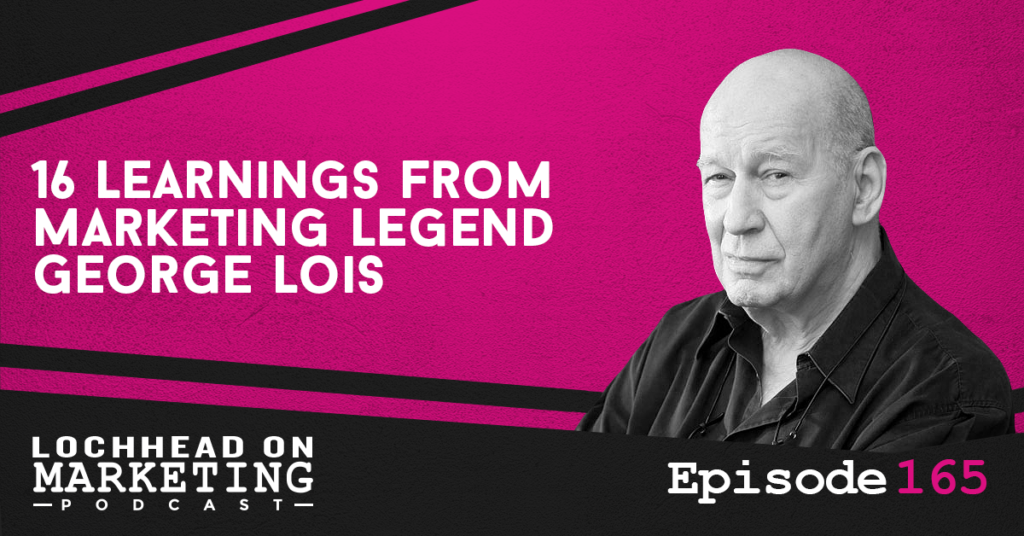
Podcast (lochheadonmarketing): Play in new window | Download (Duration: 31:20 — 21.5MB) | Embed
Subscribe: Apple Podcasts | Spotify | RSS | More
The Wall Street Journal says, “George Lois is the one the only prodigy or fathead, founder of agencies, creator of Legends, George Lewis is a genuine advertising superhero”. George Lois is well known if not famous for designing culture, changing cover images for Esquire magazine, and his “call your cable company and tell them I want my MTV”. That campaign made the music video category and made MTV the Category King. In his life and career, he broke every rule, created legendary categories and brands, and he did it in a brash, bold, exciting way.
Sadly, we recently lost this legend at 91 years old. George Lois died just three months after his beloved wife, Rosemary died. And he is one of my heroes, a man that so many of us in marketing owe so much. And yet, most young people in entrepreneurship, marketing and creative endeavors and design. Don’t really know of him. But if you’ve ever done anything in entrepreneurship in category design or marketing, that breaks boundaries, you’re following in George’s footsteps, and you might not even know it.
Today, let’s dig into some of George’s life’s teachings. Because if you want to become legendary, you have to study the legends.
Welcome to Lochhead on Marketing. The number one charting marketing podcast for marketers, category designers, and entrepreneurs with a different mind.
George Lois and a Damn Good Advice
George Lewis was born in June 1931, and he passed in November 2022. And it is said that in the end, we are all remembered for two dates, and a dash. And I’m here to tell you that George made some legendary shit out of his dash.
I want to focus on a book of his called Damn Good Advice for People with Talent, How to unleash your creative potential by America’s master communicator, George Lois. If you have not read this book yet, I would suggest you do so.
What I want to share with you are some of the learnings from this book – not all of them, but some of them that really have spoken to me over the years and made a big difference for me that I think might make a big difference for you.
Force a Choice
Idea number one is to Force a Choice. At the very beginning of damn good advice, George says this:
“There are only four types of person you can be: one, very bright, industrious, [your perfect]. Two, very bright lazy [a damn shame]. Three, stupid lazy, you’ll sit on your ass, so you’re a wash. And four, stupid industrious [uh oh, you’re dangerous]. If you’re a number one or a number two, you’ll get a lot out of this book, if you’re number three, or number four, why you reading this book?” – George Lois
So right off the top and this landmark piece of work by George, he’s doing what legendary brands do, which is they attract who they are for, and they repel who they are against. Legendary brands force a choice, not a comparison. And best I can tell, that’s how George lived his life.
You are who you are
Big Idea number two: Around here, we would express it as Follow Your Different. In George words, he writes:
“Whether you’re male, female, black, Hispanic, Native American, Asian, ethnic, or gay, and wherever you work, you are who you are. And that’s what you are, and be damn proud of it. Don’t change your name. Don’t change your accent, don’t change your heritage, don’t denigrate a humble upbringing. Be true to yourself, and you’ll ring true to the world.” – George Lois
To learn more about the different teachings of George Lois, download and listen to this episode.
Bio
Links
Learn more about George Lois
More about George Lois:
We hope you enjoyed this episode of Lochhead on Marketing™! Christopher loves hearing from his listeners. Feel free to email him, connect on Facebook, Twitter, Instagram, and subscribe on iTunes!
296 Our Worst Episode with Neil Pearlberg, Santa Cruz Surf & Skateboard Podcast Legend from Off The Lip Radio
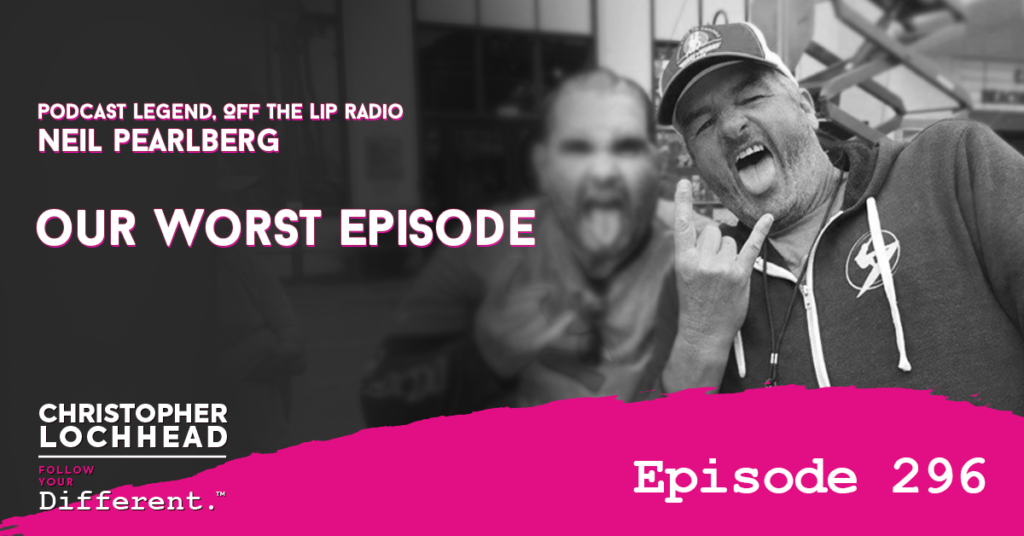
Podcast: Play in new window | Download (Duration: 59:52 — 41.1MB) | Embed
Subscribe: Apple Podcasts | Spotify | Pandora | RSS | More
On almost every episode of Christopher Lochhead: Follow Your Different, we strive to provide radically valuable, radically different real dialogues that hopefully make a big difference. Today, we aspire to do none of that. Because what you’re about to hear is a fun funny ADHD conversation with our guest, my buddy and Santa Cruz icon, Neil Pearlberg.
So sit back and listen to two buddies have a conversation while the cocktail flows and the better judgment goes out of the window.
Neil Pearlberg On podcast high jinks and Cameo
The conversation begins with some light-hearted ribbing about podcasting, and how they don’t get together often anymore unless there’s a podcast. There’s also a couple of stories about their previous attempts and always having an issue every time they do so.
Afterwards, Christopher brings up the idea of Cameo, and maybe hiring someone to do audiobook readings of their Category Pirates mini books. They muse if UFC fighters could be good audio books readers, and also wonder how much they would charge if they set up their own Cameo.
Neil Pearlberg on high-profile guests to the podcast
The conversation then shifts to the past guests they’ve had on their respective podcasts, particularly the higher-profiled ones.
Neil recalls the time when he had Jimmy Panetta on as his guest, back when he was still a District Attorney and was running for Congress. He remembered how nervous he was and how he wanted to ask great questions rather than the usual ones they dish out at interviews.
So as Neil’s interview winds down and he is down, to his last question, he decides to take a chance.
“So at the end of my 10 questions. I’m like, fuck it, I’m just gonna ask the guy. Because I know he’s gonna say No, and I’m not afraid of the word No.
So I said, “Mr. Panetta, What could you tell me? What it was like to be in the situation room with you and Obama went off to bin Laden? Can you describe to me that process?” I’m thinking, “Fuck no. Hey, that’s top secret”, you know?
He answers, “Do you have half an hour?” Yes, sir. I do. And he told that story about the whole thing with the three helicopters and that black ops and Navy Seals and the whole thing was badass. was pretty cool.”
– Neil Pearlberg
Getting Banned on Twitter
Christopher then talks about Twitter, and given its recent trends, how he got suspended for the most ridiculous reasons.
One of his suspensions was from an offensive Covid tweet, where he sarcastically replies that Bill Gates has a farm that puts Covid on 5G towers (a weird conspiracy hoax perpetuated at the time). Unfortunately, Twitter customer service bots can’t detect sarcasm, and he was suspended the next day, although he got immediately reinstated once he deleted the tweet.
Though given the current trend, getting banned or suspended on Twitter is almost a badge of honor for some, especially if their ban came from the most ridiculous or offhand reason. Which is sad, because despite its flaws, Twitter remains one of the few places were people could have an open discourse, provided it is executed properly.
To hear more from Christopher Lochhead and Neil Pearlberg, download and listen to this episode.
Bio
Since September 2009, Neil Pearlberg has written over 200 articles covering the sport of surfing, as well as skateboarding, and soccer, for the Bay Area News Group, & Santa Cruz Waves.
He is also the host of the “Off the Lip Radio Show”, & Hour Local Radio Show aired on Santa Cruz Radio Show KSCO AM 1080, FM 104.1, ksco.com and streamed on Santa Cruz Waves Facebook Page.
Neil has also published articles in Adventure Sports Journal, National Geographic, Stand Up Paddle Board Magazine.
Links
Connect with Neil Pearlberg!
Off the Lip Radio | Instagram | Twitter | Linkedin
We hope you enjoyed this episode of Christopher Lochhead: Follow Your Different™! Christopher loves hearing from his listeners. Feel free to email him, connect on Facebook, Twitter, Instagram, and subscribe on iTunes!
164 How to be a Legendary Creator/Writer: Sachit Gupta & Christopher Lochhead Unpack #1 Bestseller Snow Leopard
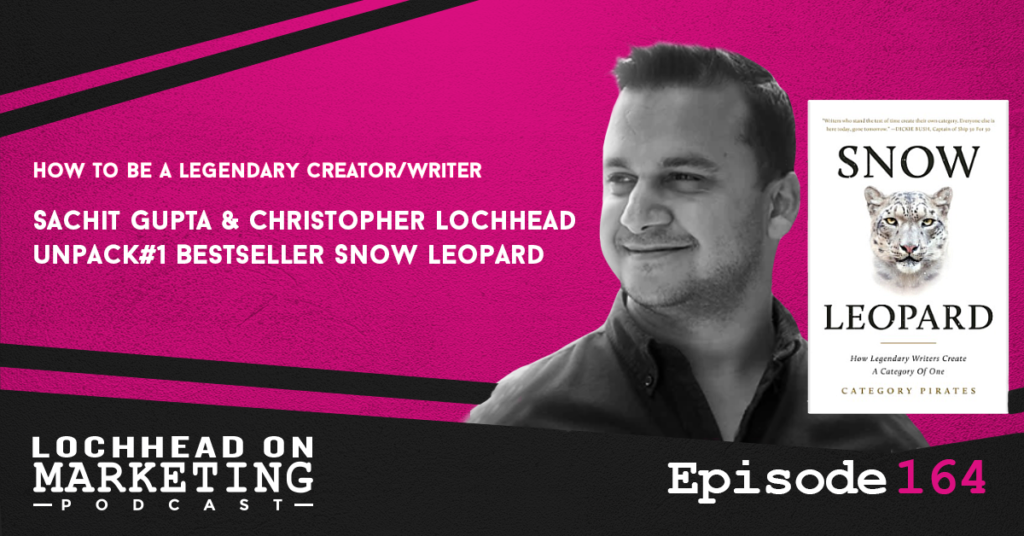
Podcast (lochheadonmarketing): Play in new window | Download (Duration: 1:37:55 — 67.2MB) | Embed
Subscribe: Apple Podcasts | Spotify | RSS | More
Recently, I was a guest with the legendary Sachit Gupta on his fantastic podcast called Conscious Creators, which I highly recommend. During our conversation on his podcast, we unpack Category Pirates’ most recent book Snow Leopard. Our producer Jason DeFilippo heard this podcast and thought it’d be a great idea to drop it here for you.
What you’re about to hear is me and Satya go deep on what it takes to be a successful native digital creator slash writer.
Welcome to Lochhead on Marketing. The number one charting marketing podcast for marketers, category designers, and entrepreneurs with a different mind.
The Reason for Podcasting
The conversation starts off with a discussion of how the two first met, and it was through the legendary podcaster Jordan Harbinger. Christopher was looking into getting sponsors and thinking about was to monetize his podcast, and was recommended to Sachit Gupta this way.
While he did get ideas on different styles of monetization, the biggest thing that Christopher got out of the conversation was the realization that monetization was not his primary focus on doing podcasts.
“I sort of had this aha that said, “Hey, wait a minute, dude, this was actually never about money”. And if I want to make money, I know how to go do that. So you sort of set my head straight, and that the emphasis was on the wrong syllable that if I wanted to make money, I knew how to go make money in a way that was much more exponential than being essentially an ad salesperson.
The real gift you gave me around podcasting, was that I’m not doing this to monetize.”
– Christopher Lochhead
Sachit Gupta on Monetizing Directly vs Indirectly
One of the things that Sachit wanted to share was that one doesn’t have to monetize directly. Focus on making good content first and foremost, so that you can reach out and cultivate an audience naturally, rather than going for cookie-cutter approaches for a short-term viral status.
“Here’s what I see happening in this greater world right now: there’s a stat that I think like 75% of youngsters want to be YouTubers, and the path most of them see in front of them is go on YouTube or something else and create content that’s for the extremes, because that’s what spreads. And then once you chase views and get to a certain level of audience, you can monetize in some way, right. And if you don’t become big, you can’t monetize. In your book, you call like the obvious content, which is not really the stuff that’s useful.”
– Sachit Gupta
While there is merit to uploading consistent content, you don’t have to flood your audience with bit-sized content that is just a big nothing burger. Creating meaningful content, let’s say once every week or two is way better than just dropping portion-sized content that just adds to the collective brain-rot of society.
The Content Pyramid
The topic then shifts to the concept of the content pyramid, and what types of people thrive in each level.
Consumers, for example, are at base of the pyramid and consists of the largest section of it. In internet culture, there is something known as the 1% rule, which states that on social media platforms, 1% create while 99% consume.
Most people spend their entire lives being content consumers—not content creators. And that’s totally fine, so long as you understand you’re not “playing the game.” You’re sitting on the sidelines watching the game.
In order to “get in the game,” you must move out of consumption and up The Content Pyramid.
To hear more of the conversation between Sachit Gupta and Christopher Lochhead, download and listen to this episode.
Bio
Connect with Sachit Gupta!
Website | Conscious Creators Show | Twitter | Instagram | LinkedIn
We hope you enjoyed this episode of Lochhead on Marketing™! Christopher loves hearing from his listeners. Feel free to email him, connect on Facebook, Twitter, Instagram, and subscribe on iTunes!
295 How To Have A Legendary Career In Tech, Designing The A.I. Category, & IPOing with Bruce Cleveland, Bestselling Author of Traversing the Traction Gap
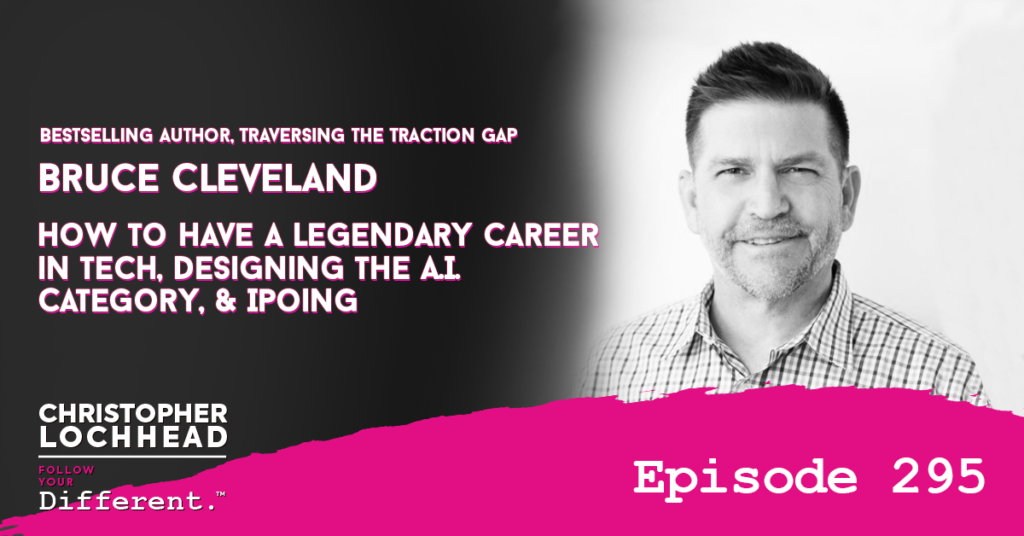
Podcast: Play in new window | Download (Duration: 1:16:17 — 52.4MB) | Embed
Subscribe: Apple Podcasts | Spotify | Pandora | RSS | More
On this episode of Christopher Lochhead: Follow Your Different, we go deep with one of my favorite people in Silicon Valley, Bruce Cleveland.
Bruce Cleveland has had a career in Silicon Valley for over 40 years. And he’s pretty much done it with building companies, technologies, categories, and brands, as well as working on and with some of Silicon Valley’s best executive teams and entrepreneurs. He’s been a successful investor.
He’s also a bestselling author. In fact, one of my favorite books is Traversing the Traction Gap, which he wrote. And I recommend it to all entrepreneurs.
By the end of this dialogue, we hope you’ll have gained radical new insights into how you can do legendary things in your life and career.
Traversing the Traction Gap
The conversation begins with a discussion of Bruce Cleveland’s book, Traversing the Traction Gap. His best-selling book was praised by Silicon Valley insiders and many entrepreneurs for the information and insights it provided.
Bruce shares that his reason for writing the books stems from people trying to make VC seem like a mystical thing, rather than explaining things in a clear way.
“The reason I wrote it was because I began to grow pretty weary of really, really smart people not making it. Their companies not surviving for a variety of reasons. And they all tended to be pattern-matched against those reasons. I was also not happy with the venture community in its entirety, because I don’t think it was honest with a lot of these entrepreneurs as to why they weren’t getting investments, etc. And I kind of wanted to demystify those issues.”
– Bruce Cleveland
Bruce Cleveland on helping out entrepreneurs
Another reason Bruce gives for writing out the book is that he wanted to help out fellow entrepreneurs who may be feeling lost, or guide those who are doing well into things that could make their ventures better.
“The purpose and objective of this book was to share with entrepreneurs that, “hey, here’s some things you could possibly do to significantly enhance the probability of success.”
You know, we only get one shot at this life, I felt like I owed it back to the entrepreneurs of the world who take all the risk as to what I saw, from my vantage point, both as an operating exec and as an investor, to why I thought things weren’t working for the vast majority of startups.”
– Bruce Cleveland
C3.ai and Enterprise AI
The conversation then goes to Bruce’s latest ventures into category creation. Together with Tom Siebel, they founded C3.ai, which delves into enterprise AI.
Bruce then talks about how it came to be, and how working on C3.ai has been so far.
“I think this is one of the benefits of having a CEO who understands and believes in category creation, is that it as your job as CMO becomes much easier to do.”
– Bruce Cleveland
When they started conceptualizing and creating the category of enterprise AI, the term wasn’t even on the radar. While there were companies who were doing something similar to a lesser degree, it wasn’t clearly defined, and no one was pursuing rapid advancement on it.
Now, it’s something that a lot of companies are looking at, and C3.ai is at the forefront of it.
To hear more from Bruce Cleveland and how to have a legendary career in VC and tech, download and listen to this episode.
Bio
Bruce Cleveland’s career in Tech spans more than 40 years as a venture investor and operating executive.
He was a first investor and a board member of Marketo, which held an IPO in 2013 and was acquired in 2018 by Adobe for $4.75B.
He was an early-stage investor in other notable companies such as C3.ai, Doximity, Vlocity, and Workday. Bruce also held senior executive roles in engineering, product management and product marketing at Apple, AT&T, C3.ai, Oracle and Siebel Systems.
His book, Traversing the Traction Gap, is a prescriptive guide for startups and new product initiatives within larger companies helping teams to use ‘market engineering’ techniques to successfully transition from Ideation to Scale.
He attended the US Military Academy, West Point, New York, and received a BS in business administration from CSU, Sacramento. He lives in the San Francisco Bay Area.
Connect with Bruce Cleveland!
Check out his book here: Traversing the Traction Gap
We hope you enjoyed this episode of Follow Your Different™! Christopher loves hearing from his listeners. Feel free to email him, connect on Facebook, Twitter, Instagram and subscribe on iTunes!

